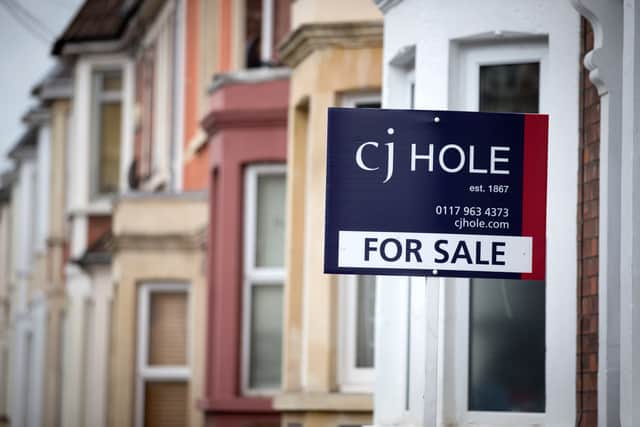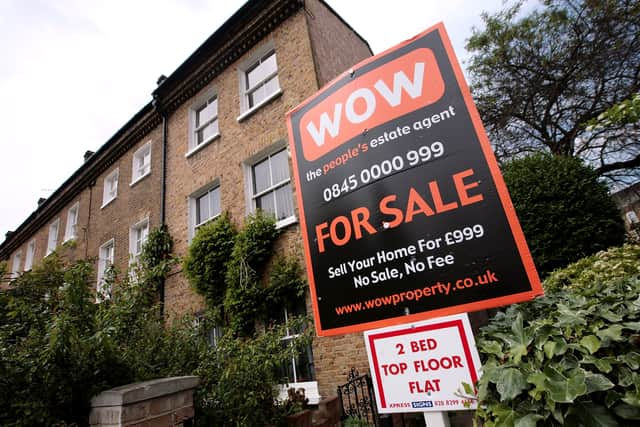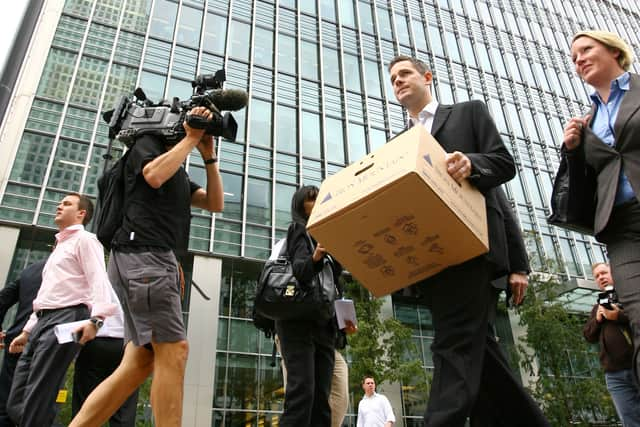Will the housing market crash? Could UK property prices fall in 2022 - and when are they likely to come down
and live on Freeview channel 276
There are growing concerns that the UK is headed straight towards another housing market crash.
The British Pound has fallen to a record low against the US Dollar, which has seen the Bank of England hike interest rates by 0.5 percentage points to 2.25%.
Advertisement
Hide AdAdvertisement
Hide AdThe rising rates have seen some mortgage lenders pull their deals due to the volatile market.
House prices have soared since the Covid-19 with the average cost of a home in September 2022 sitting at £367,760 according to property website Rightmove.
However, with rising interest rates, homeowners have been left wondering whether they will be able to pay their mortgage.
The Bank of England has predicted the UK is headed for a recession in 2022, with soaring living costs hitting households hard.
Advertisement
Hide AdAdvertisement
Hide AdThe last time the UK entered a prolonged recession in 2008, house prices crashed, leaving many homeowners in negative equity.
Here’s everything you need to know about whether the housing market will crash in 2022.


How much does it cost to buy a house in the UK?
Buying a house in the UK has risen steeply since the Covid-19 pandemic.
Latest figures show that house prices in England have reached a record high.
Advertisement
Hide AdAdvertisement
Hide AdThe average house price in England according to Rightmove is now £367,760.
This leaves many first time buyers priced out of the market, even if they have a stable income and a deposit.
Low interest rates have also made borrowing for a mortgage cheaper, however with interest rates now rising, people can expect to pay higher costs for their mortgage.
After the pandemic, there was a surge in demand for houses.
Halifax described this as a “race for space” where people who lived in the city moved to the countryside.
Advertisement
Hide AdAdvertisement
Hide AdHowever, with the falling rate of the British Pound, potential homeowners have seen mortgage offers withdrawn following the government’s mini-budget on Friday (24 September).
Virgin Money, Halifax and Skipton Building Society have all withdrawn some of their mortgage deals after the British Pound plummeted.
In a statememt Halifax said: “As a result of significant changes in mortgage market pricing we’ve seen over recent weeks, we’re making some changes to our product range.
“There is no change to product rates, and we continue to offer fee-free options for borrowers at all product terms and LTV levels, but we’ve temporarily removed products that come with a fee.”
Advertisement
Hide AdAdvertisement
Hide Ad

Will the housing market crash in 2022?
There is growing speculation that the housing market could crash in 2022.
High interest rates coupled with the cost of living crisis has seen households squeezed as they try to afford rising energy, fuel costs and now mortgage payments.
The Bank of England has predicted that inflation in the UK will hit 13% by the end of 2022.
However, despite this, house prices have risen consistently, making it the longest steady price increase for six years.
Advertisement
Hide AdAdvertisement
Hide AdWith the increase of interest rates and soaring inflation there is concern that buyers will be put off.
Homeowners who are on fixed rate mortages will also struggle to find similar affordable rates when their contracts end.
There are an estimated 1.8 million households on fixed rate mortages in the UK.
Speaking to the Daily Express, Graham Cox, Director of Bristol-based Self Employed Mortgage Hub has warned that those households“simply won’t be able to afford the mortgage payments”.
Advertisement
Hide AdAdvertisement
Hide Ad“Unless the Government steadies the ship, we’re heading for a house price crash of 20 to 40 percent over the next couple of years.
“There are 1.8 million borrowers coming off fixed-rate deals next year. They simply won’t be able to afford the mortgage payments, forcing them to sell or be repossessed.”
If the UK goes into recession will house prices go down?
When a country goes into recession, house prices will inevitably fall.
With higher cost of living and risk of unemployment, many prospective buyers will be unable to purchase a home, or even start planning to.
Advertisement
Hide AdAdvertisement
Hide AdRecessions also bring much uncertainty, meaning banks are often reluctant to lend.
According to the Office for National Statistics (ONS), during the house market crash of 2008, the average UK house price dropped by 15%.


What happened during the 2008 housing crisis?
In 2008, the UK went into a recession and the housing market collapsed.
The recession was caused in part by banks lending mortgages to people who were unable to pay them.
Advertisement
Hide AdAdvertisement
Hide AdOvernight banks went bust, with big names such as the Royal Bank of Scotland having to be bailed out by taxpayers.
Between 2008 and 2009 the average UK house price dropped by 15%.
Many homeowners were left in negative equity, which is when the value you have paid for your property is below its worth.
Comment Guidelines
National World encourages reader discussion on our stories. User feedback, insights and back-and-forth exchanges add a rich layer of context to reporting. Please review our Community Guidelines before commenting.
